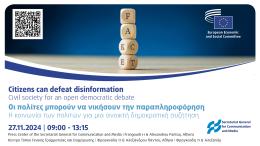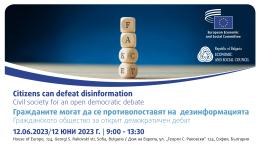European Economic
and Social Committee
Ρωσία
Η επιτροπή παρακολούθησης «ΕΕ-Ρωσία» είναι το εσωτερικό όργανο της ΕΟΚΕ που είναι αρμόδιο για τις σχέσεις με τη ρωσική κοινωνία των πολιτών.
Μετά την έναρξη του πολέμου κατά της Ουκρανίας από τις αρχές της Ρωσικής Ομοσπονδίας στις 24 Φεβρουαρίου 2022, η ελεύθερη κοινωνία των πολιτών στη Ρωσία έχει φιμωθεί από ειδικούς νόμους και αυξανόμενη καταστολή, ενώ πολλοί επικριτές του καθεστώτος έχουν εξαναγκαστεί σε εξορία.
Υπό τις παρούσες δύσκολες συνθήκες, η ΕΟΚΕ αποφάσισε να διατηρήσει ανοικτή την πόρτα για διάλογο με το αντιπολεμικό τμήμα της ρωσικής κοινωνίας των πολιτών που έχει παρουσία στο έδαφος της ΕΕ.
Αυτό έχει οδηγήσει σε γόνιμες ανταλλαγές πληροφοριών και απόψεων σχετικά με τον τρόπο με τον οποίο θα πρέπει να προχωρήσουν οι διμερείς σχέσεις μετά το τέλος του πολέμου και την επιστροφή στην ελευθερία και τη δημοκρατία στη χώρα.




